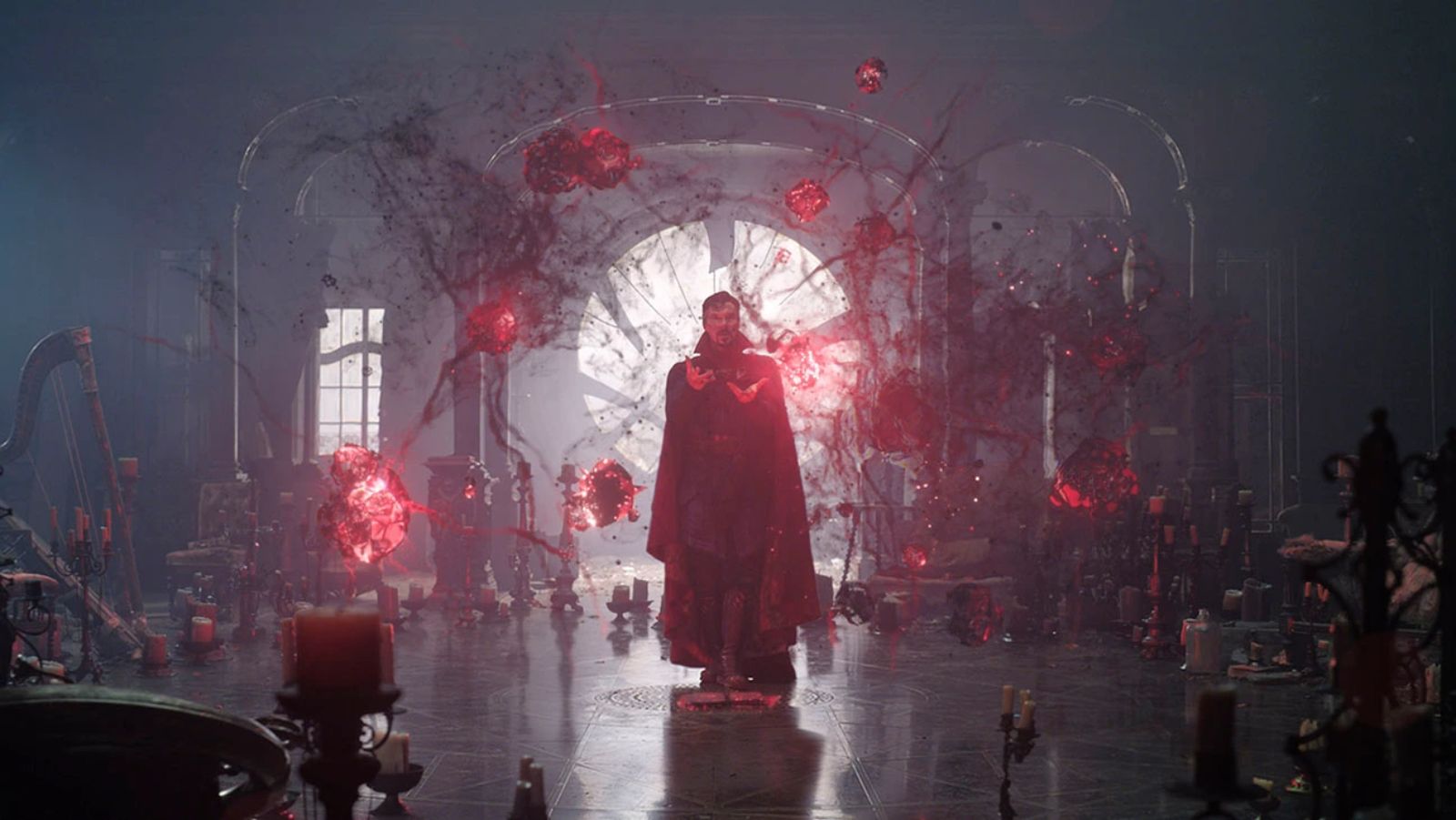If existence is indeed a rat’s nest of narratives playing out in mood-swinging incoherence across universes, Doctor Strange in the Multiverse of Madness may be onto something. Bringing Sam Raimi into the fold after co-opting the nostalgia of his beloved contributions to the genre, Marvel Studios presents a product that delivers exactly what such a relationship implies: a tentpole blockbuster at odds with itself, its studio, and its director, yet more entertaining than that mixture should allow.
Following the events of Spider-Man: No Way Home, Doctor Stephen Strange (Benedict Cumberbatch) finds himself plagued by dreams of the multiverse. Said dreams feature America Chavez (Xochitl Gomez), a multiverse-jumping teenager hitherto unknown to him. In his waking hours, when not plagued by the personal fallout of his more egomaniacal tendencies, he happens upon America in the clutches of Gargantos, a cycloptic squid-monster acting on behalf of Wanda Maximoff (bent on sapping America’s powers for herself). In order to keep their pursuers at bay, Strange and America unwittingly embark across dimensions to acquire a mystical book that will grant them power to save both the girl and multiverse itself.
If narrative objectives are simple, plotting is somehow both overthought and staggeringly listless. Forced to hinge on elements from various streaming properties (e.g. WandaVision), the arc propelling Madness’ key conflict is absent from the film itself. Instead the viewer is saddled with more than a few hours of homework just to generate a full grasp of the motivations at hand. Conversely, the two heroes are left with bare-minimum characterization that feels like an afterthought. There is even a moment wherein a literal flashback device is used to provide emotional context to their woes. It’s the laziest bit of screenwriting since Chewbacca was on another transport. The specious threads join setpieces that are either sporadically inventive or patently mandated. It’s mostly general incoherence born of Disney+ connective tissue and studio test-screen reactionism.
Pace is a constant issue. The initial setup, slapdash though it is, moves briskly enough, leading to beats (an interdimensional montage and a requisite but funny Bruce Campbell cameo) that relish the potential oddity tucked in the film’s premise. That oddity is eschewed by a second act nakedly composed of reshoots and studio notes in a manner not seen since perhaps Iron Man 2. Cameos by characters old and new seem to trade on the No Way Home school of storytelling. This technique rewards devotees for simply recognizing things rather than generating fully earned or emotional moments worthy of a registered reaction. It grinds proceedings to a halt with disastrously empty CGI pre-viz goop—before Sam Raimi can conjure up some magic and rescue things at the last minute.
Raimi seems to operate in direct conflict with the impulses of his overlords. In doing so he mines more from the likes of the Evil Dead trilogy or Drag Me to Hell than prior superhero fare. The result is some distinct tonal dissonance, but the veteran horror auteur injects a ghoulish life into entire sequences that provide Madness with not only its best moments, but some of the more playful things we’ve seen across this 14-year franchise. After a press tour that made no promises of Raimi’s stamp on this film, there is thankfully more of his scrappy, devilish style than you might expect. With possessions, hellfire, demons, and (of course) the undead at his disposal, he turns the film itself into an attempt at demonic possession. Through a sorcery all his own Raimi tries overtaking a soulless corporate product with demons and ghouls. And it sometimes works, ultimately paying off through a third act that resurrects the film from complete drudgery.
This whole concoction plays like a battle of wills between its makers, a closet full of monsters being Trojan-horsed into brand synergy. The morbid joy Sam Raimi manages to induce here is undeniable. The madness, perhaps, is that he must manifest his violent delights through a content delivery system for babies.
Doctor Strange in the Multiverse of Madness opens wide on Friday, May 6.

